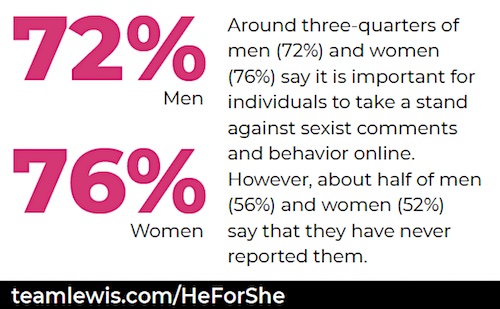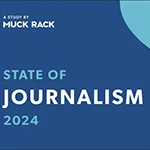 |
While women make up 40 percent of the global workforce, they’re still lagging behind when it comes to equal treatment in areas ranging from the workplace to STEM disciplines to the online world. That’s the conclusion of a new report from TEAM LEWIS Foundation.
“Participation Parity,” which was conducted in support of HeForShe (the UN Women Solidarity Movement for Gender Equity) and International Women’s Day, finds that while women are definitely gaining in all those areas, the hurdles they face have not been overcome yet. The study’s authors add that the contributions of male allies could play a major role in moving the needle forward.
Although three out of 10 of the women surveyed (30 percent) said that there was a lack of female mentors and role models in their organizations, the number of women in senior management positions is on the rise. More than half of the women responding to the survey (56 percent) said that there were women in senior management roles at their workplaces, while 82 percent said that there were women in “high-level roles.”
For women working in STEM disciplines, the hurdles seem to be a bit higher. 55 percent of the young women noted that “there is a stigma surrounding women in STEM jobs.” For women from 18 to 24, the biggest obstacle cited was “stereotyping or unconscious bias,” while women from 25 to 34 were most aware of “a lack of opportunities or visibility.”
 |
Although women are entering online spaces that were once overwhelmingly male-dominated (such as gaming), they are facing relatively high levels of sexism and misogyny there. More than half of the women surveyed (53 percent) and nearly as many men (47 percent) said that the number of sexist comments they see online makes them uncomfortable.
But many of those who are bothered by those comments avoid confronting the perpetrators. More than four in 10 (42 percent) women surveyed said that they avoid addressing sexism online because they fear retaliation, with 29 percent of men agreeing.
There does, however, appear to be widespread belief that it’s necessary to combat online sexism, with over three-quarters (76 percent) of women and 72 percent of men saying it is “important for individuals to take a stand against sexist comments.”
Men are also becoming more aware of the role they can play in addressing the problem. Almost half (47 percent) said they have “made a conscious effort to become more aware of sexism.”
TEAM LEWIS’ study polled more than 6,000 respondents across the US, UK, Germany, France, Mexico, Singapore, China, Spain and the Netherlands from February 16-27.


 Consumers who once demanded convenience now require consistent, multi-channel experiences that cater to them at every point. Brands must have a clear, audience-appropriate, and channel-specific voice across all platforms.
Consumers who once demanded convenience now require consistent, multi-channel experiences that cater to them at every point. Brands must have a clear, audience-appropriate, and channel-specific voice across all platforms. Employees at U.S. companies are experiencing high levels of burnout, but managers are lagging behind when it comes to their awareness of the problem
Employees at U.S. companies are experiencing high levels of burnout, but managers are lagging behind when it comes to their awareness of the problem Brand has a powerful effect on a company’s valuation, but the level of brand understanding in the investment community leaves a lot to be desired, according to a new study from Brodeur Partners, Interbrand and NewtonX.
Brand has a powerful effect on a company’s valuation, but the level of brand understanding in the investment community leaves a lot to be desired, according to a new study from Brodeur Partners, Interbrand and NewtonX. AI may still be viewed with a wary eye by most media pros, but its use is growing, according to a new study from Muck Rack.
AI may still be viewed with a wary eye by most media pros, but its use is growing, according to a new study from Muck Rack. A new study from Walker Sands says that some marketers have been putting the cart before the horse when it comes to the relationship between marketing channels and business outcomes.
A new study from Walker Sands says that some marketers have been putting the cart before the horse when it comes to the relationship between marketing channels and business outcomes.


 Have a comment? Send it to
Have a comment? Send it to 
Mar. 10, 2023, by Joe Honick
There should be no question about the struggles of women for a sense of equality in their careers. What does need to be examined is any similar comparisons of percentages, whether between sexes, races or other data to make the points of concern. In professional and collegiate football, for example, the vast majority of participants happen to be black, but that can only be argued in terms of talent for the work to be done, not racial discrimination until, of course, discussion reaches the coaching ranks. My point is how to more carefully use the element of percentages in statistical comparisons. Do women of particular racial designations deal fairly with those of different ethnicity and race?